Ensuring Safe Operations: Why You Should Engage Machine Safety Consultants
Elevating workplace safety, compliance and productivity in WA’s machine-intensive industries
In the industrial heart of Western Australia, from manufacturing plants in Perth, to mines and processing facilities across the Goldfields and the Pilbara, heavy machinery is at the core of productivity. But with that power comes risk: machines can injure workers, disrupt operations, and expose companies to regulatory penalties. That’s where the role of specialised professionals becomes vital. Hiring qualified machine safety consultants Perth enables businesses to mitigate machine-related hazards, comply with legislation, and integrate safe, efficient operation into their plant design and processes.
Whether you operate a fabrication workshop, a large manufacturing line, or a mining processing plant, machine safety is no longer an optional extra. It must be embedded in every stage of your operations. In this article we’ll explore what machine safety consulting involves, why Perth-based operations should invest locally, what value it brings, how to choose the right consultant, and what you can expect from the engagement.
What is Machine Safety Consulting?
Machine safety consulting is a specialist service focused on ensuring machinery, automated systems and manufacturing plants are designed, installed, operated and maintained so as to minimise risk to people, equipment and the environment. A machine safety consultant (or consultancy team) works across a broad range of tasks including risk assessments, compliance audits, guarding design, control system safety (e.g., emergency stops, interlocks), safety standards alignment (such as AS 4024), training of personnel, and verification/validation of safety functions.
For companies in Perth and beyond, engaging machine safety consultants Perth means bringing in external expertise that understands both the national Australian safety and WHS (Work Health & Safety) frameworks and the unique asset-intensive environment of Western Australia. They can help integrate safety into design, operations and maintenance rather than simply treating it as a one-off audit.
Typical Services Provided
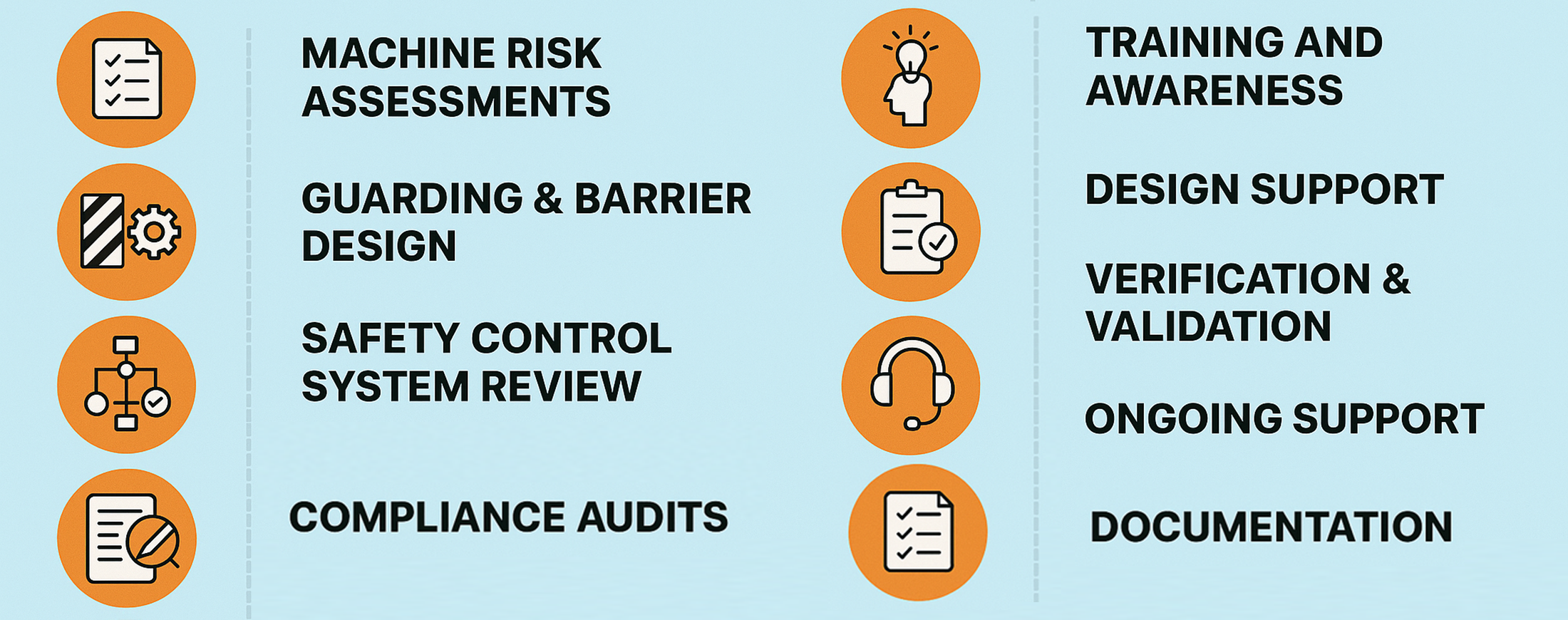
Some of the common services from machine safety consultants include:
- Machine risk assessments: identifying hazards (mechanical, electrical, ergonomic, control‐system) and assessing risk levels.
- Guarding & barrier design: selecting appropriate guards, interlocks, light curtains, fencing, etc.
- Safety control system review: verifying e-stops, safety circuits, interlocks, control reliability, redundancy.
- Compliance audits: checking machinery and processes against standards such as AS 4024 (series), ISO 13849, IEC 62061, and local WHS legislation.
- Documentation: generating safety reports, risk registers, machine safety plans, maintenance checklists and operator instructions.
- Training and awareness: educating machine operators, engineers and maintenance staff on safe practices.
- Design support: assisting with new machinery installations or modifications to ensure safe-by-design.
- Verification & validation: testing safety functions and preparing evidence for regulatory or client audit.
- Ongoing support: periodic audits, incident investigations, improvement programs.
Why Engage Local Specialists in Perth?
There are several compelling reasons for Western Australian businesses to engage local machine safety consultants Perth rather than remote or generic providers:

- Knowledge of local regulatory environment
WA has its own interpretation and enforcement of WHS laws, and many industries (mining, processing) have state regulations, licensing and auditing practices. A local consultant understands these specifics.
- On-site presence and rapid response
Many machine safety tasks require physical inspection of equipment, site walk-throughs, or in-person meetings. Having consultants in or near Perth ensures quicker mobilisation and better face-to-face collaboration.
- Industry-relevant experience
WA has major sectors such as mining, oil & gas, manufacturing, and agriculture and local consultants often have experience working in these environments. For example, one Perth-based risk & functional safety firm works with iron-ore, rail and aluminium clients. Black Ice Systems
- Understanding of regional hazards
The operational environment in Western Australia may have specific machine safety challenges heavy mining equipment, remote locations, harsh climate, long shift patterns all of which local consultants account for.
- Reduced travel costs and scheduling delays
Using a local consultant may reduce travel time, cost, and scheduling complexity compared with interstate or overseas firms.
The Business Case: Why Machine Safety Pays Off
Investing in machine safety consulting is not just about regulatory compliance it has tangible operational, financial and reputational benefits.
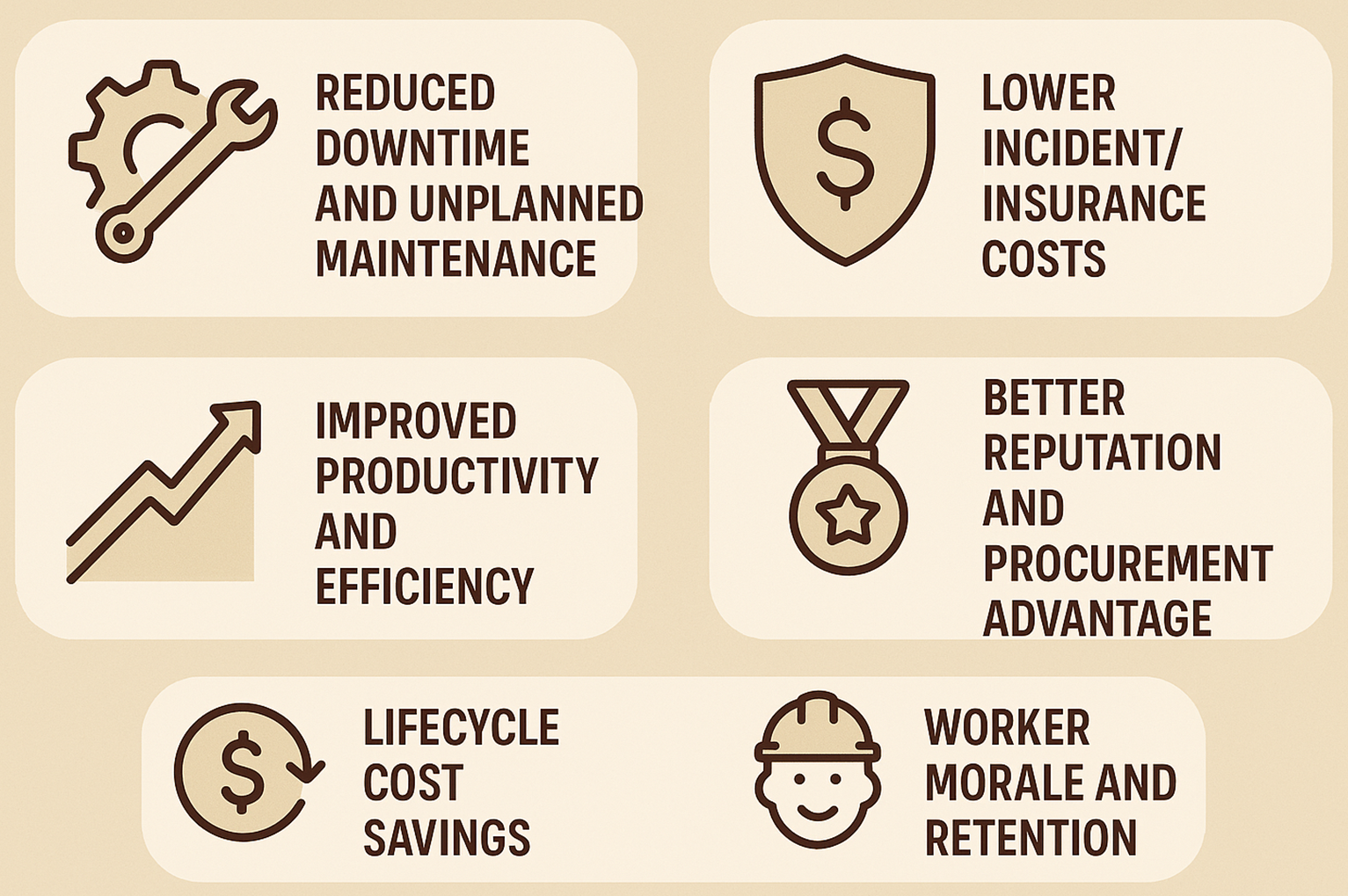
Some of these include:
- Reduced downtime and unplanned maintenance: Proper machine safety design and maintenance minimise accidents, breakdowns and stuck equipment, which means production keeps flowing.
- Lower incident/insurance costs: Machine-related incidents (injuries, damage, production stoppages) are costly. Identifying and controlling hazards reduces the likelihood of incidents and associated insurance claims or regulatory fines.
- Improved productivity and efficiency: When machinery is designed and maintained safely, operators can work with confidence, fewer stoppages and better throughput. Some consultants emphasise the productivity benefits alongside safety.
- Better reputation and procurement advantage: Companies that can demonstrate strong machine safety credentials – such as documented risk assessments, compliance with standards, safe operating procedures – may have an edge in tenders and contracts, especially in sectors like mining and heavy industry.
- Lifecycle cost savings: Addressing safety early (at design or installation) is cheaper than retrofitting problems later. Machine safety consultants can advise early, thus saving major cost downstream.
- Worker morale and retention: Employees are more motivated and feel more valued when operating in safe environments. This contributes to workforce stability, which is critical in regional WA operations.
Key Considerations When Choosing Machine Safety Consultants in Perth
Not all consultants are equal, especially when it comes to machine safety.
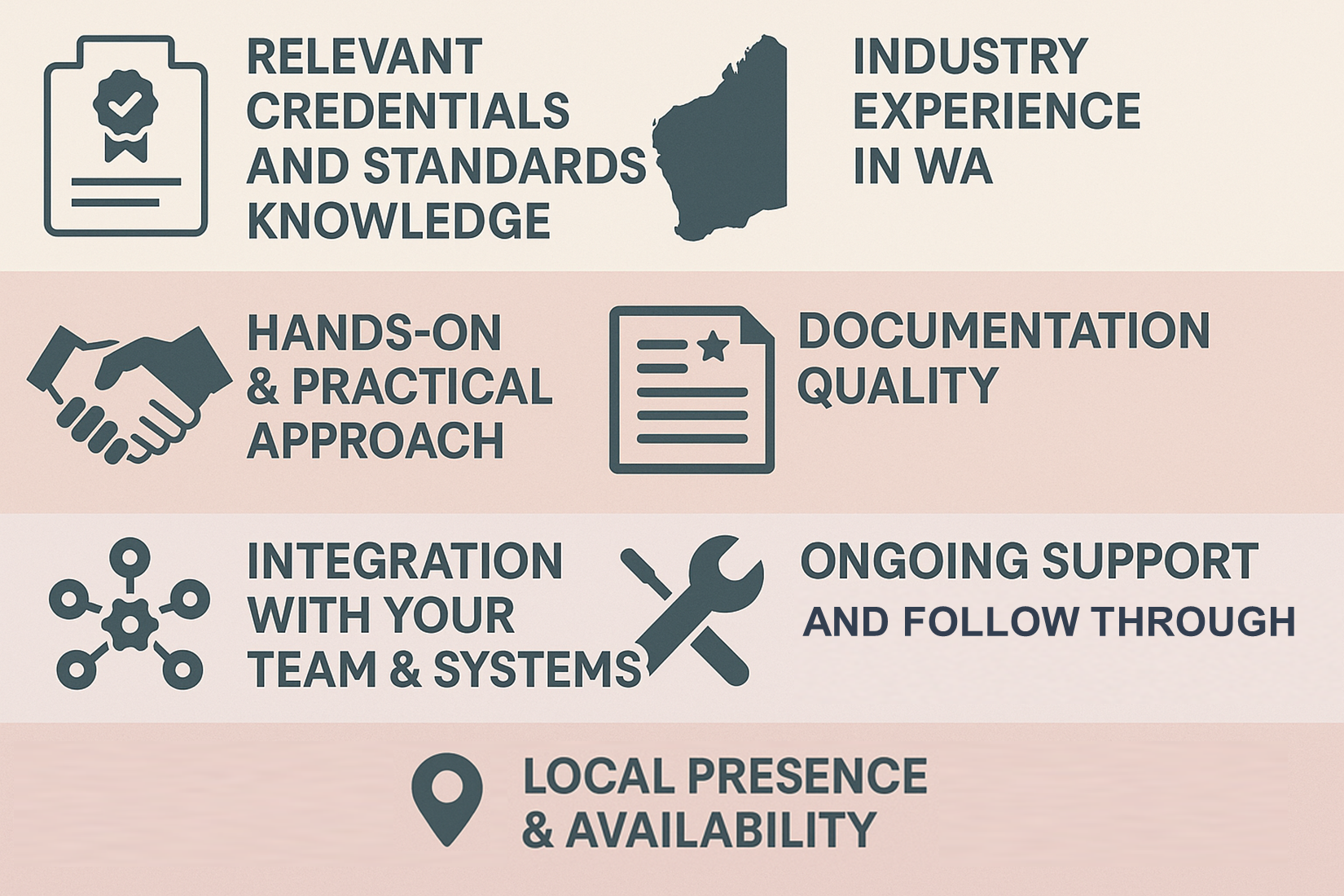
Here are critical factors to evaluate when selecting machine safety consultants Perth:
1. Relevant Credentials and Standards Knowledge
- Ensure the consultant knows relevant standards like AS 4024 (Safety of Machinery), ISO 13849 (Safety-Related Parts of Control Systems), IEC 62061, etc.
- Look for experience in machine safety, functional safety, automation and risk engineering.
2. Industry Experience in WA
- Prefer consultants who have worked in Western Australian industries such as mining, heavy manufacturing or processing plants not just generic office-based safety consultancy.
- Ask for case studies or references in similar environments.
3. Hands-on & Practical Approach
- Machine safety is a pragmatic discipline theoretical knowledge helps, but the consultant must be comfortable in shop floors, plant environments, dealing with real equipment, maintenance and operators.
- Their recommendations should be actionable, cost-effective and tailored. Not just generic checklists.
4. Documentation Quality
- You’ll need detailed reports: risk assessments, machine safety plans, documentation for guarding, safety circuits, modifications, etc. Ensure the consultant delivers clear, well-structured documentation that aligns with your audit or regulatory requirements.
5. Integration with Your Team & Systems
- The consultant should work collaboratively with your engineering, maintenance, operations and safety teams not just a one-off external audit.
- Look for someone who provides training, handover, and ongoing support.
6. Ongoing Support and Follow-through
- Machine safety is not a one-time event; equipment evolves, modifications happen and new hazards emerge. Ensure the consultant offers or supports periodic reviews, updates and continuous improvement.
7. Local Presence & Availability
- Especially for regional WA operations, ensure the consultant can travel to site, respond to urgent issues and collaborate in real time.
How a Machine Safety Consultancy Engagement Works

Here’s a typical breakdown of how an engagement with machine safety consultants Perth might unfold:
Phase 1: Initial Consultation & Scope Definition
- The consultant meets key stakeholders (safety manager, maintenance manager, operations lead) to clarify machine types, production processes, hazards, compliance needs and objectives.
- They identify scope: e.g., specific machines for assessment, a full line review, or a new installation design.
Phase 2: Data-Gathering & Site Inspection
- On-site walk-through of machines, controls, guarding, operations, maintenance practices.
- Review of machine history (incidents, modifications, maintenance logs), drawings, control system documentation, operator procedures.
- Interviews with operators, maintenance staff and supervisors to understand challenges.
- Review of existing documentation such as risk assessments, safe work procedures, machine drawings.
Phase 3: Risk Assessment & Gap Analysis
- Use of formal risk assessment frameworks (e.g., EN ISO 12100, AS 4024, ISO 13849) to identify hazards, estimate risk levels, and evaluate current safety measures.
- Gap analysis to identify where machine safety falls short of standards or best practice.
- Prioritise findings: High-risk machines or processes flagged for immediate attention.
Phase 4: Recommendations & Safety Plan
- The consultant delivers report with findings, photographs, risk ratings, recommended corrective or improvement actions (guarding upgrades, interlocks, safety circuits, maintenance changes).
- Safety plan includes timeframe, responsibilities, cost estimate, risk reduction benefits.
- For new machinery, the consultant may provide design input (safe-by-design), control logic review or equipment specification guidance.
Phase 5: Implementation Support
- The consultant may support implementation: supervising guarding installation, verifying control system modifications, providing acceptance testing or verification of safety functions.
- Training sessions for operators/maintenance on safe machine operation, hazard awareness, lock-out/tag-out, safe maintenance work.
- Assistance in updating documentation: safe work procedures, operator instructions, maintenance schedules, risk registers.
Phase 6: Follow-up & Verification
- After actions have been implemented, consultant revisits site for verification that recommendations were completed as specified.
- A final verification or acceptance report is provided.
- Consultants may schedule periodic reviews or audits to ensure ongoing compliance and continuous improvement.
Key Machine Safety Topics for WA Industries
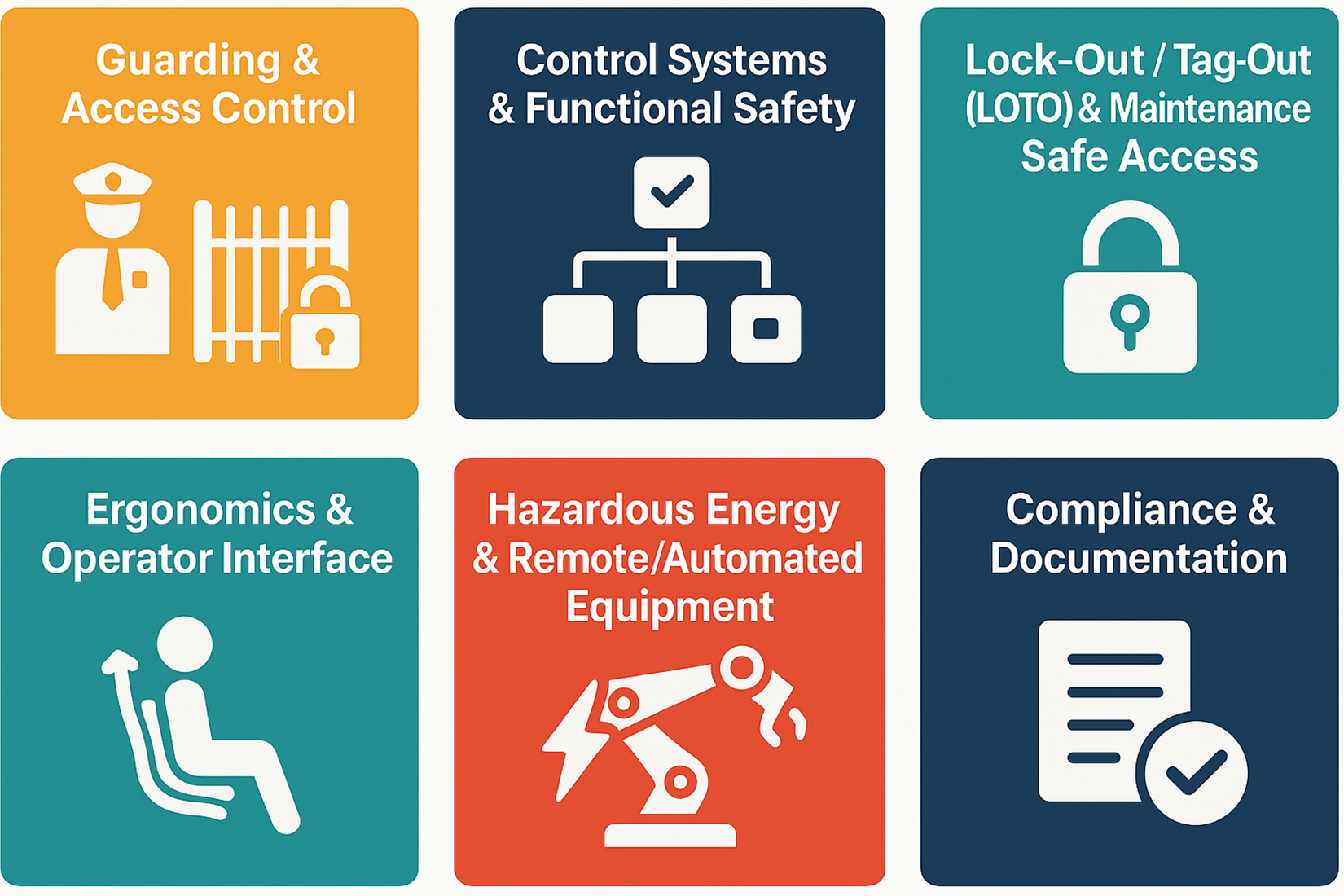
In Western Australia, some machine safety topics are especially important given the nature of local operations:
Guarding & Access Control
For mining equipment, processing lines and manufacturing plants in industrial zones around Perth, properly designed guards, interlocks, access control systems and safe maintenance platforms are essential. The consultant will ensure access points are controlled, guards are robust, and maintenance mode is safe.
Control Systems & Functional Safety
Modern machines increasingly include programmable logic controllers (PLCs), safety relays, or even safety-rated controllers. Compliance with ISO 13849 / IEC 62061 is becoming standard. A consultant will verify the safety control architecture for emergency stops, safety rated controls, redundancy, diagnostics, fault monitoring and safe state transitions.
Lock-Out / Tag-Out (LOTO) & Maintenance Safe Access
Many incidents occur during maintenance or remote equipment servicing. WA operations must ensure machines have safe isolation procedures, proper training, permit systems and maintenance platforms. The consultant helps design robust OHS systems around machine maintenance.
Ergonomics & Operator Interface
Machine safety is not purely mechanical – ergonomics, human-machine interface (HMI), operator fatigue, shift patterns and ambient conditions in WA can all influence risk. Consultants will assess operator tasks, reach zones, controls, lighting and work environment to minimise human error.
Hazardous Energy & Remote/Automated Equipment
Especially in processing plants or mining, machines may include remote or automated systems, robotic elements, conveyors, and crushers. Consultant input is critical to design safe interactions between humans and machines, safe access, emergency stop systems, and hazard zones.
Compliance & Documentation
For audits by regulators (such as WorkSafe WA), contractors, or clients, having documented risk assessments, machine safety reports, verification records, maintenance schedules and safe work procedures is essential. The consultant ensures you have the documentation aligned with standards and regulatory expectations.
Common Pitfalls and How to Avoid Them
Even experienced organisations make mistakes when it comes to machine safety.

Here are a few common pitfalls and how engaging the right consultant helps you avoid them.
- Treating machine safety as a one-off audit: Machine safety must be part of the lifecycle design, operation, maintenance and decommissioning. A consultant ensures continuity.
- Neglecting maintenance and ageing machinery: Older machines, modification history, wear and tear increase risk. A consultant will audit legacy machines.
- Poor documentation and traceability: If you cannot show how risk assessments were done, or safety functions verified, an audit or regulator may raise concerns. A consultant helps build robust documentation.
- Operator behaviour and culture ignored: Machine safety isn’t just about hardware. Culture, training, maintenance procedures and human factors matter. A consultant addresses these non-technical aspects.
- Modification without review: Over time machines are modified, extended, or repurposed (especially in WA mining/processing). Without a fresh risk assessment, hazards creep in. A consultant ensures modifications are reviewed.
Case Example: Applying Machine Safety Consulting in a Perth-Based Manufacturing Plant
Imagine a manufacturing facility in the Perth region producing heavy steel fabrications. The plant uses large CNC plate rollers, welding stations, automated material handling, and overhead cranes. Over time, management noticed increases in near-misses relating to machine access, unguarded pinch points and maintenance staff working around live equipment. They engaged machine safety consultants in Perth to conduct a full review.

The process included:
- Walk-through inspections of plate rollers, automated load/unload cells, welding cell enclosures.
- Interviews with operators, maintenance staff and production supervisors.
- Risk assessment using AS 4024 frameworks, identifying several high-risk machines lacking interlocked access doors and proper e-stop coverage.
- A gap analysis revealed no documented machine safety plan and no lock-out/tag-out procedures for automated load/unload.
- Recommendations provided: retro-fit interlocks on automatic doors, redesign access platforms to align with ergonomic best practice, implement a programmable safety controller for the load/unload station with diagnostics, train maintenance crews on LOTO practices, and update site documentation.
- Implementation phase involving supplier selection, installation, safety logic testing, verification and operator training.
- A four month follow-up audit confirmed the machine access incidents had dropped, operator confidence improved, and the plant was able to provide evidence for client audits.
Because the consultants were local (Perth-based), they were able to do frequent site visits, had good understanding of WA manufacturing regulations and ensured the plant’s improvement plan aligned with state WHS expectations.
What to Expect in Terms of Cost and Timeline
The cost of engaging machine safety consultants varies depending on scope, number of machines, site complexity, travel requirements, equipment condition and whether it includes verification/testing, training or design support. As a rough guide:
- Preliminary site inspection and risk assessment for a small plant with a few machines might take a couple of days and cost accordingly.
- A full audit of a large automated production line or remote processing facility might take weeks and cost significantly more.
- Implementation and verification add further cost (guards, safety circuits, training, documentation).
- Ongoing reviews or periodic audits are often done on retainer or maintenance contract.
As for timeline:
- Initial consultation and scoping: 1-2 weeks.
- Data gathering and inspection: 1-3 weeks depending on site scale.
- Report, recommendations and safety plan: 1-2 weeks post inspection.
- Implementation: varies (from a few weeks to many months depending on corrective actions).
- Verification/follow-up: typically 1-3 months after implementation.
Remember: while cost is often visible upfront, the cost of machine-related incidents, production stoppage, insurance claims or regulatory fines is far higher.
Steps to Prepare Your Organisation for a Machine Safety Consultancy Engagement
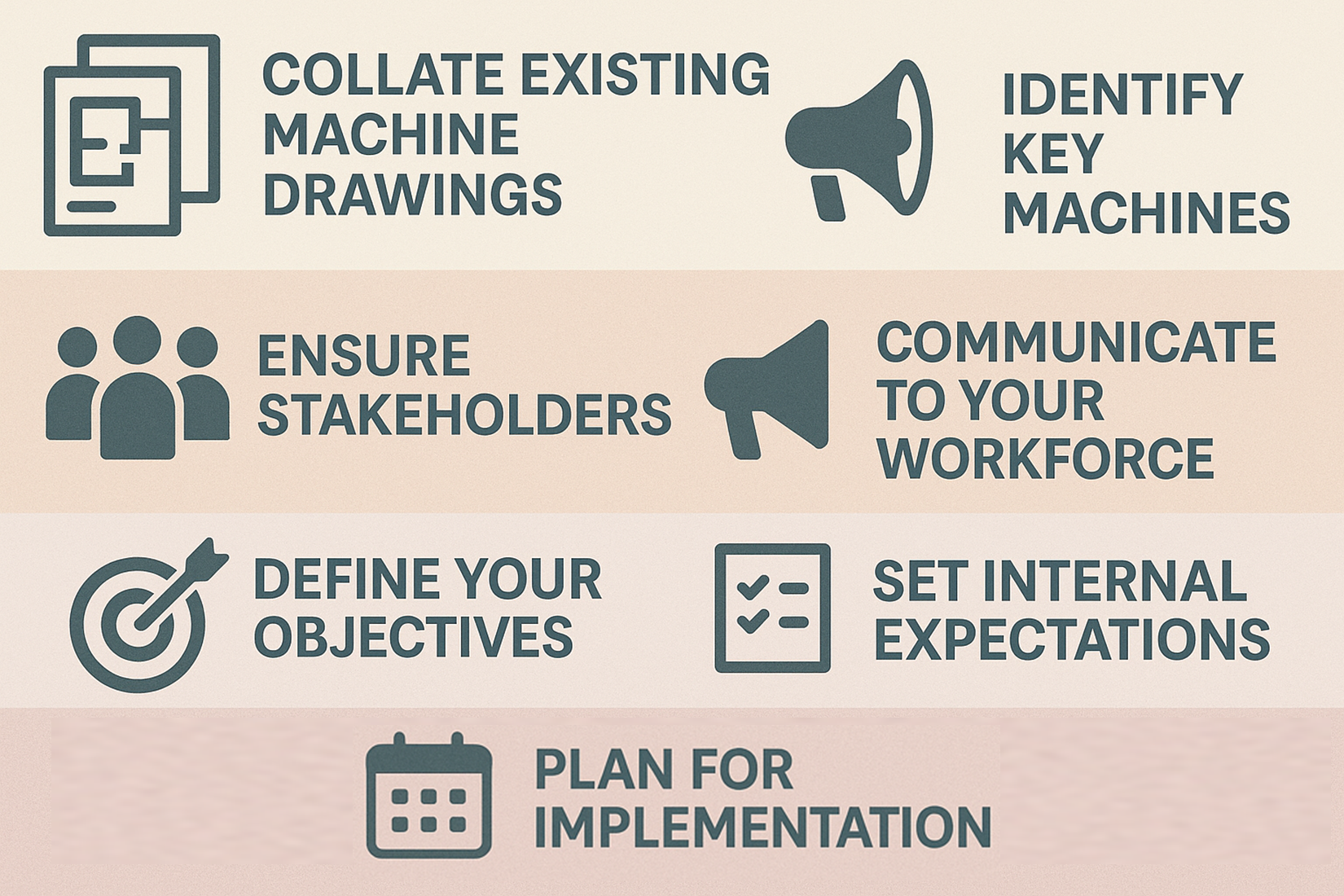
To maximise value from engaging consultants, prepare your organisation by taking the following steps:
- Collate existing machine drawings, maintenance history, incident/near-miss logs, operator manuals and any previous risk assessments.
- Identify key machines of interest, e.g., highest production throughput, highest risk machines, or machines with known issues.
- Ensure stakeholders (operations, maintenance, safety, engineering) are engaged and available. Their input is crucial.
- Communicate to your workforce about the upcoming review. This builds cooperation and prevents surprise.
- Define your objectives: safety regulatory compliance, production improvement, insurance readiness, new machine installation support.
- Set internal expectations: timelines, roles, budget, and what you expect from the consultant (reporting format, documentation deliverables, training).
- Plan for implementation: once recommendations come in, you’ll need resources, budget and ownership to act on them. Without action, the review may lose value.
Trends in Machine Safety for Western Australia
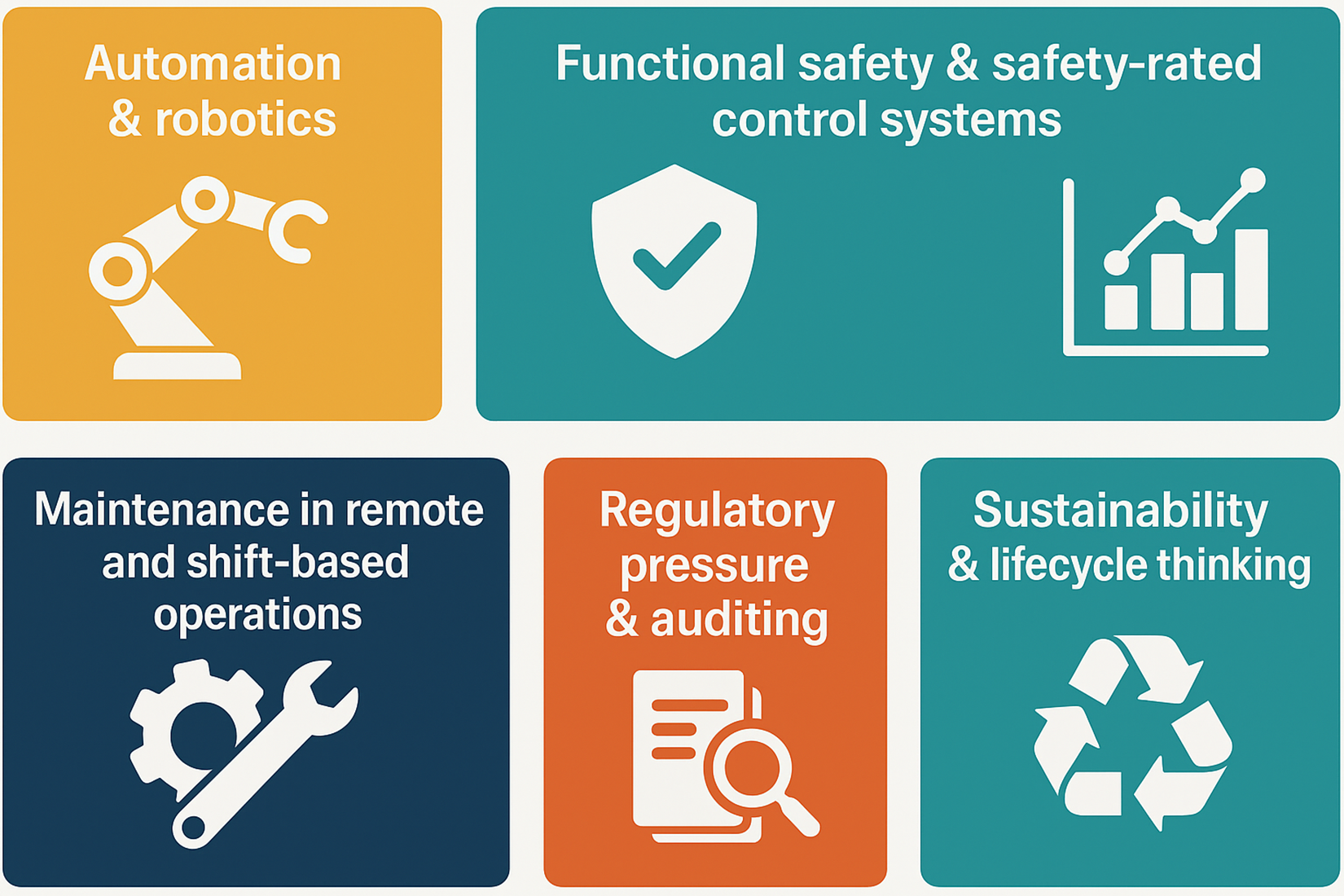
Several trends are shaping the machine safety consulting landscape in WA and more broadly:
- Automation & robotics: More plants are using robotic cells, automated conveyors and remote systems. Machine safety consultants must now address robot safety (e.g., ISO 10218, ISO/TS 15066) alongside traditional machine guarding.
- Functional safety & safety-rated control systems: As reliance on control logic increases, auditors and consultants increasingly focus on functional safety lifecycle (ISO 13849, IEC 62061) and verification of safety-related parts of control systems.
- Maintenance in remote and shift-based operations: WA’s remote operations require machine safety solutions that account for long travel, workforce fatigue, remote supervision and environmental extremes.
- Regulatory pressure & auditing: Regulators, clients and insurers are demanding more robust documentation of machine safety, verification of safety circuits and proof of risk assessments. Having local machine safety consultants Perth gives businesses a credible partner in meeting these demands.
- Sustainability & lifecycle thinking: Machine safety is no longer just about immediate risk. Companies are considering the full lifecycle of equipment, energy efficiency, retrofit flexibility and safe decommissioning.
Summary – Why Machine Safety Consultants Matter
In Western Australia’s industrial and manufacturing sectors, machinery is central to productivity but without rigorous safety management, it becomes a source of risk, regulation exposure and cost. Engaging qualified machine safety consultants allows you to:
- Bring in expert knowledge of machine safety standards, control systems and risk assessment frameworks.
- Leverage local expertise and regional understanding of WA industrial operations.
- Achieve operational improvements, reduce downtime, enhance productivity and meet compliance demands.
- Create a structured safety lifecycle approach for machines: design → assess → implement → verify → maintain.
- Build credible documentation, evidence of compliance and a culture of safe operations.
By embedding machine safety into your operations right from design and installation through to maintenance and verification, you position your business for sustainable performance, lower risk and stronger competitive standing.
Related Content
Join Our Newsletter
Receive expert insights, safety updates, and the latest updates in our services and apps. Stay ahead of workplace safety, compliance, and operational efficiency delivered straight to your inbox.

.png)
.png)
.png)
.png)
.png)
.png)
.png)
.png)
.png)
.png)